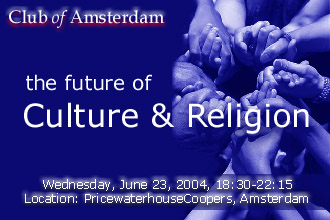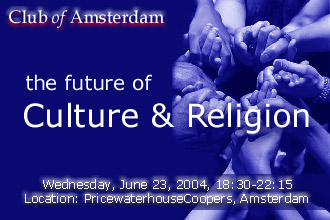|
Supporter TO BE AND NOT TO BE Four central questions arise: Can religion survive without the domain of the institutes? What are people in the future looking for, spiritually wise? What is the meaning of Muslims in Europe for the secularised western culture? Has religion evolutionary roots or is it a temporally phenomenon in human behaviour? |
|
You can download the presentations by: ![]() Jacques Janssen [*.doc]
Jacques Janssen [*.doc] ![]() Ruud Peters [*.doc]
Ruud Peters [*.doc] ![]() Anton van Harskamp [*.doc]
Anton van Harskamp [*.doc]
18:30 – 19:30
Registration, drinks, snacks, networking & great music featuring Russian singer ![]() Marynka Nicolai and her band ‘Some Lovely Girls’!
Marynka Nicolai and her band ‘Some Lovely Girls’!
19:30
Welcome by our Host ![]() Homme Heida
Homme Heida
19:45
Part I: ![]() Floor Wittink, saxophone
Floor Wittink, saxophone
Soliloguy…Pinter (1998) for altosaxophone solo by ![]() Shane Fage (*1964, Canada)
Shane Fage (*1964, Canada)
British Playwright Harold Pinter is famed for the invention of a rather unusual theatrical construct…..the Pinter pause. At the ends of lines of text (in the script), Pinter will often include a series of periods which are intended to give the actor a sense of how long his or her “pause?should be. In other words, each period may represent a moment of silence which can be as long as a second, or even 2. Ultimately, this pause can be as long as 10 to 15 seconds. The reason Pinter uses these pauses is that he wishes to create an atmosphere of incredible tension…not just for the actors on stage, but more importantly for the people sitting in the audience.
10 minutes each for ![]() Jacques Janssen, Professor of Cultural Psychology and the Psychology of Religion, section of cultural psychology and psychology of religion, University of Nijmegen
Jacques Janssen, Professor of Cultural Psychology and the Psychology of Religion, section of cultural psychology and psychology of religion, University of Nijmegen ![]() Joep de Hart, Scientific Worker, Social and Cultural Planning Office
Joep de Hart, Scientific Worker, Social and Cultural Planning Office ![]() Anton van Harskamp, Professor, Social and Cultural Antropology, VU Amsterdam
Anton van Harskamp, Professor, Social and Cultural Antropology, VU Amsterdam ![]() Rudolph Peters, Professor, Faculty of Humanities, University Amsterdam
Rudolph Peters, Professor, Faculty of Humanities, University Amsterdam
![]() Floor Wittink, saxophone
Floor Wittink, saxophone
Billie (2003), for alto saxophone and ghetto blaster by ![]() Jacob ter Veldhuis (*1951, The Netherlands)
Jacob ter Veldhuis (*1951, The Netherlands)
Billie is about the life of Billie Holiday; her struggle with drugs, discrimination and her love for music.
Jacob ter Veldhuis used samples of Billie’s voice and added rhythm and melody (played by the saxophone) to give her words a new dimension. The result is a fascinating dialogue between Billie and altosaxophone.
20:45
Coffee break
21:15
Part II: Panel with the Speakers
and our Host ![]() Homme Heida.
Homme Heida.
The panel is followed by an open discussion.

Jacques Janssen
Professor of Cultural Psychology and the Psychology of Religion, section of cultural psychology and psychology of religion, University of Nijmegen
Jacques Janssen is professor in the psychology of culture and religion, University of Nijmegen. He got his Ph.D. in 1978 on a study on student activism. Published books and articles on youth culture and the survival of religion in secularized society. Recently he is doing psychological research on praying, meditation and religious experience in line with the new cognitive science of religion.
http://www.socsci.kun.nl/psy/cultuurenpersoon

Joep de Hart
Social and Cultural Planning Office
Joep de Hart is a senior researcher at the Dutch Social and Cultural Planning Office. His Ph.D. (University of Nijmegen) was on the religiosity of Dutch youth. His publications include books on youth subcultures, religion, time budget surveys, social participation after retirement, public opinion and morals, social cohesion and civil society.
http://www.scp.nl

Anton van Harskamp
Professor, Social and Cultural Antropology, VU Amsterdam
Anton van Harskamp is researcher at the Blaise Pascal Institute, Vrije Universiteit Amsterdam and professor at the same university teaching on religion, identity and civil society. Got his Ph.D. in 1968 at the University of Nijmegen. He published on 19th century theology, social theory and the Soah. Recent publications are on secularization, new religiosity and (Christian) fundamentalism.
http://www.vu.nl
http://www.bezinningscentrum.nl

Rudolph Peters
Professor, Faculty of Humanities, University Amsterdam
Rudolph Peters (1943) teaches Islamic studies and Islamic law at the Faculty of Humanities, University of Amsterdam. He has published extensively on Islamic law (both its history and its present-day application) and on the political aspects of Islam. From 1982 to 1987 he was the director of the Netherlands Institute for Archaeology and Arabic Studies in Cairo, Egypt. His dissertation, Islam and Colonialism: the doctrine of jihad in modern history (1979) analysed the modern interpretations and the mobilizing force of the jihad doctrine.
http://www.uva.nl

Homme Heida
Homme Heida is a generalist by heart, who worked as a journalist for several mass media like Algemeen Dagblad, Tros Aktua and publishing group VNU. After ten years he started his own bureau Promedia: company journalism, which slowly changed into business journalism. Now back again with larger media, he is editor-in-chief of Global Dutch, a magazine for Dutch entrepreneurs, who are active in foreign countries.
Homme Heida has a continuing interest in a more philosophical approach of ‘being there’. His views on the future are very much based on new technologies. “Humans change only slowly by evolution. Technology will speed it up”, he argues. His credo is: ‘living body and soul’, which means to him a sportive challenge as well as an intellectual one. From the Amsterdam marathon till the Club of Amsterdam.

Floor Wittink
Floor Wittink (1976, the Netherlands) studied classical saxophone with Karel Bruin and Johan van der Linden. During her study, Floor has had masterclasses from Arno Bornkamp, Claude Delangle and others.
After earning her Second Phase degree in 2002 she studied three months at the Banff Centre of the Arts in Canada. At the Banff Centre Floor worked with resident composers and musicians, focusing on contemporary music. As a result of inspiring artistic collaborations, the idea was born to record a solo cd. Her study in Canada had not been possible without the Henri Fock fund.
Currently, Floor is playing in the Esquire Saxophone Quartet and with the pianist Marina Grigorowicz.
Besides playing chamber music, Floor freelances in orchestras such as the Rotterdam Philharmonic Orchestra.
http://www.esquiresaxofoonkwartet.nl
Shane Fage
Shane Fage (*1964, Winnipeg) is a Canadian composer of orchestral and chamber works (including music for film and documentary) that have been successfully performed in North America and Europe.
Mr. Fage began his formal musical training at the University of Calgary and has completed his MMus in composition (which he studied with Allan Gordon Bell, David Eagle and William Jordan). During the course of his studies, he was the recipient of the Province of Alberta Graduate Scholarship, the Dean’s Special Master’s Scholarship, three graduate research scholarships, a Graduate Teaching Assistantship, and the Louise McKinney Prize.
He has been a composer-in-residence at the Banff Centre several times and was the faculty ensemble coordinator for summer residents in 1999. He was a guest lecturer at the Esther Honens International Piano Competition and participated at the Krzysztof Penderecki Symposium and Festival in Kraków. He was also a liaison between the Banff Centre and the Penderecki family from 1998-2000.
Mr. Fage was one of fifteen accepted to attend the International Young Composers Meeting and competition in Apeldoorn, Holland in 2000. He was also one of the winners of the Ottawa International String Quartet Festival’s Strings of the Future Composition Competition in 2001 and his String Quartet No. 1 was chosen for public reading by the Arditti String Quartet.
His works have been performed by numerous Canadian and European ensembles and soloists, including the Arditti String Quartet, the Aurelia Saxophone Quartet, ensemble de ereprijs, the Gelders Fanfare Orchestra, the National Youth Concert Band of Canada, cellist Shauna Rolston, and the Satie Quartet, among others.
Jacob ter Veldhuis
Jacob ter Veldhuis (1951) began his career in rock music, studied composition and electronic music at the Groningen Conservatory and was awarded the Dutch Composition Prize in 1980. He made a name for himself during the 1980s with melodious and effectful compositions, straight from the heart. From his past as a rock musician he kept his interest in sound and a lively stage presentation as means of expression. He is a virtuoso in using electronics and sampling techniques involving items like the Gulf War, Chet Baker or the Jerry Springer Show, as can be heard on his new CD Heartbreakers, a colourful mixture of ‘high and low culture’.
Sold out concerts last year in Rotterdam during the four day ‘Jacob ter Veldhuis Festival’ show the growing reputation of this composer. His Goldrush Concerto became a hit, as well as the Third Quartet. Several choreographers like Hans van Manen were inspired by his music. Still a controversial figure amongst some established exponents of Dutch musical life, he has become one of the most frequently performed composers of the Netherlands today. He makes a stand against the ‘faded avant-garde’ and tries to escape from the isolated new music getto by writing in a straight – sometimes even provocative – style , banning the ‘worn out dissonant’, a completely devalued means of expression to his ears. His ‘coming out’ as a composer of ‘ultra tonal’ sugar-spiced music, has been brought to a temporary climax in the video oratorio Paradiso.
At the moment ter Veldhuis is working on orchestral works for the Residentie Orchestra and the Rotterdam Philharmonic Orchestra.






Customer Reviews
Thanks for submitting your comment!